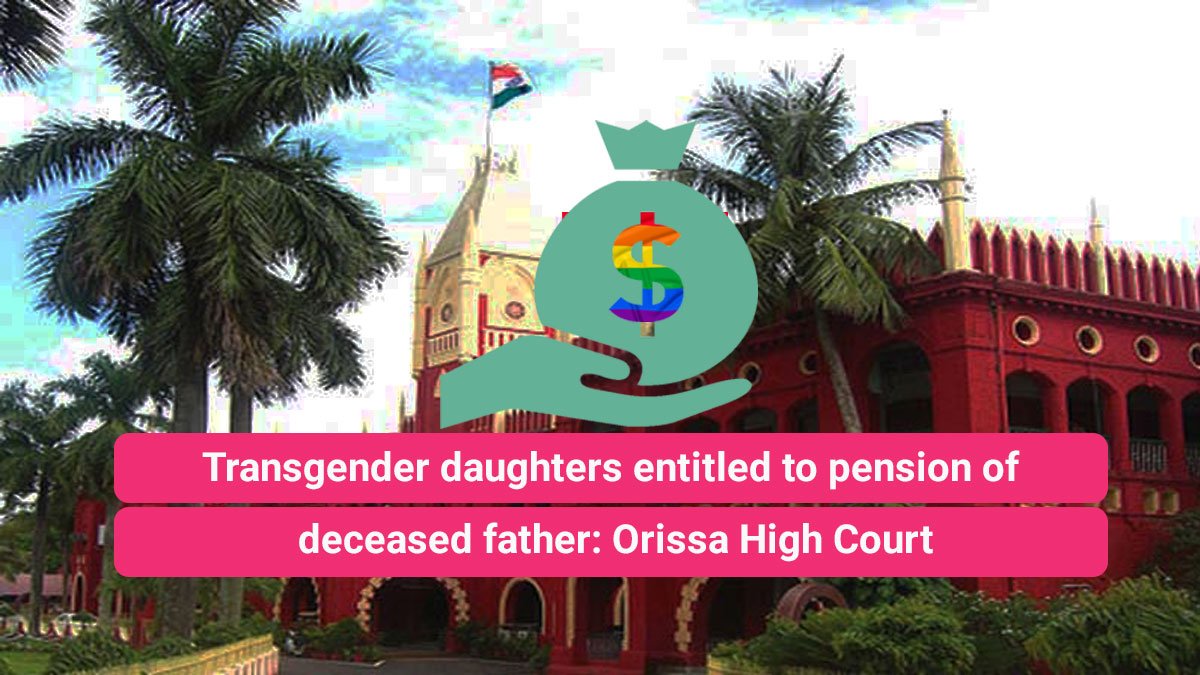A Writ Petition under Article 226 and Article 227 of Constitution of India was filed praying for the direction to opposite parties to sanction family pension in the favor of petitioner, who is a transgender woman and unmarried daughter of her late father, who was a government servant, within a stipulated period of time.
BRIEF FACTS OF THE CASE
- Late father of the petitioner was a government servant working in Rural Development Department under Executive Engineer RW Division, Rayagada. After his death, his wife was sanctioned and disbursed with the family pension. She also expired due to old age health issues.
- Thereafter, the present petitioner applied to Executive Engineer RW Division, Rayagada for family pension under Rule 56 of Odisha Civil Services (Pension) Rules, 1992.
- It was further stated that the present petitioner and her sister come under the category of unmarried daughter, widow or divorced daughter, which are eligible to get family pension.
- On perusal of pleadings in present writ petition, it was also found that the Rural Development Department wrote a letter to Principal Accountant General (A&E), Odisha, Bhubaneshwar after scrutinizing the application of the present petitioner, found her eligible to receive family pension and accordingly recommended the case of the petitioner for sanction of family pension in favor of petitioner.
- It was further revealed that the family pension should be paid to the petitioner and should be subjected to the provisions of Rule 56(5) of the Odisha Civil Services (Pension) Rules, 1992. It was also stipulated that the petitioner should get family pension till her marriage or death, whichever is earlier.
- On further scrutiny of the letter under reference, it was found out that the authority recommended the case, fully well-known that the petitioner is a transgender woman.
PETITIONER’S CONTENTIONS
- The counsel for the petitioner contended that the authorities did not consider the application of the petitioner for grant of family pension, although the Rule 56 of Orissa Civil Services (Pension) Rules, 1992 provides for payment of family pension to the unmarried daughter.
- It was also submitted that since the petitioner belongs to the transgender community, the authorities had treated her in a discriminatory manner and had not sanctioned the family pension as is due and admissible to her after the death of her parents.
- He further submitted that such conduct of the authorities is in gross violation of the pension rules as provided under Rule 56(5)(d) of Orissa Civil Services (Pension) Rules, 1992 which states that in the case of an unmarried daughter even after attaining the age of 25 years till her marriage or death whichever is earlier.
- It was further highlighted that the petitioner is a transgender woman and vide certificate issued by the District Magistrate under Rule 5 read with Section 6 of the Transgender Persons (Protection of Rights) Act, 2020, has been given legal recognition as being a transgender woman. They also said that the authorities have dealt with the case of the petitioner in a discriminatory manner and they have failed to apply the provisions of law as provided under the aforesaid Rules.
OBSERVATIONS OF THE COURT
- Considering and observing all the facts and submissions made by both parties, Court observed that the petitioner is a transgender and has right to choose her gender. Accordingly, she submitted her application for grant of family pension under Sec-56(1) of Odisha Civil Services (Pension) Rules, 1992. They said that such right has been recognized ad legalized by the judgement of Hon’ble Apex Court in NALSA case and as such, the law laid down by the Hon’ble Supreme Court is biding all.
- Court said that considering the given submissions and all the facts and circumstances, the present writ petition filed by the petitioner deserves to be allowed and same was allowed. Court also directed Principal Accountant General (A&E), Odisha, Bhubaneshwar to process the application of the petitioner as expeditiously as possible, preferably within a period of six weeks from the date of communication of certified copy of the order of present writ petition.
- They were further directed to immediately calculate, sanction and disburse the family pension as is due and admissible to the petitioner within the aforementioned stipulated time.
– Written by Vaishali Jain & Riddhima Khanna
 Cart is empty
Cart is empty 

